Commissioner’s Roundtable on Family and Community Engagement
Patrice McCarthy Executive Director & General Counsel, CABE
At the recent meeting of the Commissioner’s Roundtable on Family and Community Engagement, the new legislation on age of school entry was discussed. Effective July 1, 2024, the birthday cutoff for children entering school is changed from January 1 to September 1. The legislation provides that a child who has not reached the age of 5 may be admitted upon a written request from a parent or guardian to the principal and following an assessment of the child to ensure that admitting such child is developmentally appropriate.
Attendees raised numerous questions related to implementation, including whether a district is required to provide a waiver process, whether there is an appeal from the principal’s decision, what staff resources will be required to conduct the assessments, and what guidance will be provided to parents to assist them in making a decision as to whether to request a waiver. Department staff committed to
Steimer Sr. Staff Associate for Professional Development and Communications, CABE

The CABE/CAPSS Convention Committee is excited to announce that Michael Bonner, a renowned leader, innovator, and performance booster, who is a trailblazer in leadership development and organizational culture, will be the Friday morning keynote speaker. He is a dynamic keynote speaker as seen on The Ellen Show, NBC Nightly News, and Time for Kids. He is the CEO of Bonnerville, a business that promotes the value of self-care and a highly respected team member at the famed Ron Clark Academy.
He empowers leaders to build genuine relationships and establish a positive organizational culture, vision and team development. His seminars challenge listeners to reflect, strategize, and execute in order to increase their

Among last year’s enacted laws, the state legislature created new rules regarding remote learning in Connecticut. As one aspect of those rules, “dual instruction” in remote learning was to be prohibited. This year, in Public Act 23-150, the legislature enacted some exceptions to that prohibition.
Although dual instruction is still generally prohibited, the two allowances for dual instruction are when it is necessary to effectuate a student’s individualized education program or Section 504 plan, or when the dual instruction is a part of an intradistrict or interdistrict cooperative learning program.
The cooperative learning programs will be discussed a bit more later in the article, but it is first worth mentioning that some education leaders may have heard similar exceptions before this year’s new law. And they would have heard right, as the exceptions took a bit of a winding road to being enshrined into law this year, and in their current form.
Two years ago, Public Act 21-46 stated that districts would be allowed to offer remote learning in grades 9-12 starting in the 2022-23 school year. And last year’s Public Act 22-80 allowed boards of education to offer a program of remote learning in grades K-12 starting with the 2024-25 school year. Public Act 22-80 also prohibited dual instruction, which it defined as “the simultaneous instruction by a


w w w . c a b e . o r g Vol. 27, No. 8 September, 2023 B C
Convention Keynote
Friday Morning
See CONVENTION KEYNOTE page 2 See LAW AMENDED page 8 See ROUNDTABLE page 19
Lisa
Remote Learning Law Amended Connecticut Association of Boards of Education Inc. 81 Wolcott Hill Road Wethersfield, CT 06109-1242 Periodical Postage PAID Hartford, CT 11 Great Boards – The TIme is Now! 13 CABE Annual Report 2022-2023 18 2023 CABE/ CAPSS Convention inside Welcome back! Welcome Back, Board Members & Superintendents!
Conrad Vahlsing Sr. Staff Attorney, CABE
Catching Fireflies: One Person Can Have An Impact
Elizabeth Brown President, CABE
Did you catch fireflies when you were a kid? Remember neighborhood kids gathering at night with kitchen jars and old cans, putting holes on top so the fireflies could breathe? The magical lights pitted against the black sky? Fireflies capture the beauty and wonder of nature, a childhood memory, a gift to all of us.
I was reminded of the “catching” of fireflies in a recent article titled, “ Where Wildflowers Grow, the Nights are Alight,” telling the inspiring story of a family in a wealthy Connecticut town who embrace the wonder of nature and instead of a manicured, green lawn in keeping with the accepted look of the neighborhood, allow wild flowers to grow. “Bunnies appeared, birds came back and soon they realized they were creating a sanctuary.”
For several decades the family invited the neighborhood to a spectacular viewing of the fireflies, a neighborhood happening, a timeout to be part of the wonder of nature and ponder how only one lawn welcomes nature, an anomaly in modern times, a kind of museum to visit. Will the wonders of nature, a thriving ecosystem, and a sustainable earth be in our future? What is the role of public education in fostering a love and respect for nature ? Will nature be a “ museum” to visit on occasion?
The story of the fireflies reminds me of how one person, one family, can impact their surroundings and through example hold out a vision of
“back to nature” and living in harmony with all creation. Collective responsibility, collective appreciation for nature, and how we live in this world. Summer offers us the opportunity to connect, grow flowers, swim in the ocean, visit family and just embrace the outdoors. Refresh, rewind, rethink what’s important.
September is here. School is open. Students and staff come back to school with their own memories and experiences. School districts prepared all summer to ensure facilities are clean and updated; curriculum is current; teachers and administrators are in place; operations full steam ahead. All of these are essential to the skeleton of education. But let’s go deeper and as the saying goes, “put meat on the bones!”
Do our schools provide a welcoming environment for all students, not just in words but in deliberate actions? Policies and practice promote not only student learning, but student engagement in community, building relationships, experiencing fun and developing each student’s gifts and talents. The intangibles that live in a student and shape their decisions and sense of wellbeing. The fireflies of life. Indeed, the world news can be bleak and filled with unimaginable, inhumane destructive events. The dark side of humanity seemingly thrives. But as a “rose colored” glasses type of a person, I think public education and its mission to teach, to inspire, to be truth bearers, stands against the dark side of humanity.
How does public education
prepare students to understand, live in and impact the world in a positive manner? I believe it can start with “catching fireflies” figuratively and literally. I encourage all Boards of Education to plan for the skeleton of education but prioritize the “meat” of education which must include a commitment to live in harmony with nature and all living creation.
Wishing all school districts, a safe, exciting, meaningful school year.
Let’s all catch fireflies!
CONVENTION KEYNOTE
(continued from page 1)
efficiency in the workplace and personal areas. He empowers listeners to build genuine relationships with their teams and colleagues because “You cannot demand a withdrawal from someone you have never invested in.”
Michael Bonner’s transformative approach leaves C-suite and nonprofit leaders, educators, and administrators confident and prepared to become world-changing citizens who garner significant impact.
Michael will be signing his book, Get Up or Give Up: How I Almost Gave Up on Teaching, immediately following his presentation. The book will be available in the Convention bookstore.
To learn more about Michael Bonner, visit michael-bonner.com and follow him on all social media platforms at @michaelbonner_.
Mission: To assist local and regional boards of education in providing high quality education for all Connecticut children through effective leadership.
Vision: CABE is passionate about strengthening public education through high-performing, transformative local school board/ superintendent leadership teams that inspire success for each child.
Board of Directors
EXECUTIVE COMMITTEE
Elizabeth Brown | President, Waterbury
Leonard Lockhart | First Vice President, Windsor
Meg Scata | Vice President for Government Relations, Portland
John Prins | Vice President for Professional Development, Branford
Lon Seidman | Secretary/Treasurer, Essex
Donald Harris | Immediate Past President, Bloomfield
Anthony Perugini | Member at Large, Cheshire
Lydia Tedone | NSBA Director, Simsbury

AREA DIRECTORS
Marion Manzo | Area 1 Director, Region 15
Douglas Foyle | Area 2 Co-Director, Glastonbury
Tyron Harris | Area 2 Co-Director, East Hartford
Jay Livernois | Area 4 Director, Woodstock Academy
Dan Cruson | Area 5 Director, Newtown
Janice Cupee | Area 6 Co-Director, Stratford
Lee Goldstein | Area 6 Co-Director, Westport
George Kurtyka | Area 7 Co-Director, Derby
Robert Guthrie | Area 7 Co-Director, West Haven
Lon Seidman | Area 8 Director, Essex
Carol Burgess | Area 9 Co-Director, Montville
Bryan Doughty | Area 9 Co-Director, New London
ASSOCIATES
Eileen Baker | Associate, Old Saybrook
Ann Gruenberg | Associate, Hampton
Anthony Perugini | Associate, Cheshire
Robert Mitchell | Associate, Montville
Joseph Wilkerson | Associate, Bloomfield
COMMITTEE CHAIRS
Becky Tyrrell | Chair, Federal Relations, Plainville
Laurel Steinhauser | Chair, Resolutions, Portland
Jaime Barr Shelburn | Chair, State Relations, East Lyme
CITY REPRESENTATIVES
Joseph Sokolovic | City Representative, Bridgeport

A. J. Johnson | City Representative, Hartford
Yesenia Rivera | City Representative, New Haven
Versha Munshi-South | City Representative, Stamford
STAFF
Patrice McCarthy | Executive Director and General Counsel
Nicholas Caruso | Senior Staff Associate for Field Services and Coordinator of Technology
Jody Goeler | Senior Staff Associate for Policy Service
Sheila McKay | Senior Staff Associate for Government Relations
Lisa Steimer | Senior Staff Associate for Professional Development and Communications
Conrad Vahlsing | Senior Staff Attorney
Wendy DeBarge | Coordinator of Finance and Administration
Pamela Brooks | Senior Administrative Associate for Policy Service and Search Services
Terry DeMars | Administrative Associate for Policy Service
Gail Heath | Administrative Associate for Government Relations
Wilmarie Newton | Administrative Associate for Digital Communications
Nancy Propfe | Administrative Assistant for Membership Services
Corliss Ucci | Receptionist and Assistant to Executive Director CABE Journal (ISSN 1092-1818) is published bi-monthly by Connecticut Association of Boards of Education, 81Wolcott Hill Road, Wethersfield, CT 06109. Periodicals postage Paid at Hartford, CT.”
POSTMASTER: Send address changes to The CABE Journal, CABE, 81 Wolcott Hill Road, Wethersfield, CT 06109-1242. CABE membership dues include $30 per person for each individual who receives The CABE Journal. The subscription rate for nonmembers is $75. Association members dues include a subscription for each Board Member, Superintendent, Assistant Superintendent and Business Manager. The companies and advertisements found in The CABE Journal are not necessarily endorsed by CABE.
2 The Journal – Connecticut Association of Boards of Education | September, 2023
PRESIDENT COMMENTARY
CABE Executive Director and General Counsel Patrice McCarthy talked with Fox61 about educator shortage areas.
CABE Affiliate Members
BUSINESS AFFILIATES
VALEDICTORIAN
Connecticut Business Systems –
A Xerox Company
Finalsite
SALUTATORIAN
Berchem Moses PC
Shipman & Goodwin
HIGH HONORS
Pullman & Comley
HONOR ROLL
JCJ Architecture
Kainen, Escalera & McHale, P.C.
Newman/DLR Group
Solect Energy
SCHOLAR
Brown & Brown
Chinni & Associates, LLC
Coordinated Transportation Solutions
Dattco, Inc.
ESS
Franklin Covey
The Lexington Group
Perkins Eastman
Public Agency Retirement Services (PARS)
The S/L/A/M Collaborative
Zangari Cohn Cuthbertson
Duhl & Grello, P.C.
EDUCATIONAL AFFILIATES
American School for the Deaf Area Cooperative Educational Services (ACES)
Booker T. Washington Academy
Cambridge International
Capitol Region Education Council (CREC)
Connecticut Alliance of YMCAs
Connecticut Arts
Administrators Association
Connecticut Association of School Business Officials (CASBO)
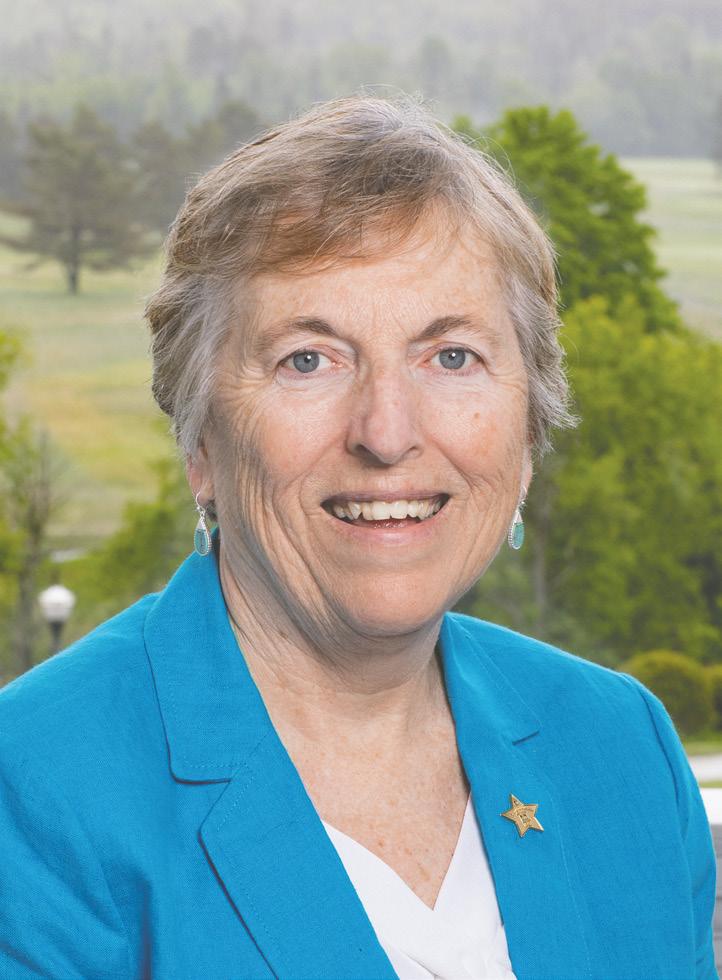
Connecticut School Buildings and Grounds Association (CSBGA)
Connecticut School Counselor Association
Connecticut Technical High Schools
Cooperative Educational Services (C.E.S.)
EASTCONN
EdAdvance
Explorations Charter School
Great Oaks Charter School
Integrated Day Charter School ISAAC LEARN
EXECUTIVE
DIRECTOR COMMENTARY
New Beginnings
Patrice McCarthy Executive Director & General Counsel, CABE
Many people see January 1 as a time of new beginnings, but for board of education members, superintendents, educators, school bus drivers, students, parents and CABE staff the new school year is an annual milestone of new beginnings. The summer months brought several opportunities to engage in professional development, and we can now apply our new learning in the board room or the classroom.
The executive directors of school board associations around the country met last month and shared ideas on many topics, including orientation of new board members, educator recruitment and retention, dealing with controversial issues, and supporting prospective superintendents. (I learned that in Tennessee the superintendent, or “director of schools”, is only required to have a baccalaureate degree!) While we are already addressing all of these issues in Connecticut, it is always helpful to hear other perspectives as
we work to continuously enhance our support to school boards.
CABE’s annual Summer Leadership Conference was another learning opportunity filled with networking and new learning. Attendees were engaged in exchanging ideas, renewing friendships and making new connections from the moment they arrived, and as they lingered after dinner.
Board members and superintendents serving as presenters provided their insights on the implications of AI for school boards and dealing with controversial issues. Table top discussions focused on emerging legislative issues, communications and policy issues.
Board chairs, many of whom participate in CABE’s board chair check in via Zoom, had the opportunity to engage with their colleagues in person. Student voice was heard loud and clear with a panel of three students providing insights on their educational experience and recommendations to support student leadership.
CABE’s Diversity, Equity and Inclusion Committee also met and
identified a robust set of initiatives to support school boards in meeting the needs of all students, including the recruitment and retention of minority educators, curriculum enhancements, and helping communities understand why diversity matters.
The opportunity to participate in learning experiences at the national and state levels is rewarding. We have not only gained new insights, but have made valuable connections that we can utilize in the coming year.
I will join board members and superintendents in applying my new learning to support school boards as they focus on what is essential for student success. Let’s approach the new school year filled with the excitement and energy of our youngest students who will enter school for the first time!
The Journal – Connecticut Association of Boards of Education | September, 2023 3
Live Girl
Early Bird Registration is OPEN! 2023 CABE/CAPSS Convention Friday, November 17 Saturday, November 18 Mystic Marriott Hotel, Groton Join us as we learn together! Leading from Why SCAN TO REGISTER
New England Science & Sailing Foundation Odyssey Community School, Inc. Relay CT The Bridge Academy
See You in Court – The Nutmeg Board of Education Roles and Responsibilities of Board Members
Thomas B. Mooney, Esq. Shipman & Goodwin
The Nutmeg Board of Education makes many mistakes. The latest imbroglio created by the board will be reported here each issue, followed by an explanation of what the board should have done. Though not intended as legal advice, these situations may help board members avoid common problems.
Nellie Newbie was appointed last spring to fill a vacancy on the Nutmeg Board of Education, and she has embraced her new role with enthusiasm, so much so that she has ruffled many feathers.
Shortly after her appointment, Nellie posted a survey on social media, asking for suggestions on how she can best serve Nutmeg school community. Nellie included a promise at the end of the survey that she would leave no stone unturned in addressing each and every concern expressed. Another Board member complained to Mr. Superintendent that Nellie’s level of engagement was making the other Board members look bad, and Mr. Superintendent followed up by calling Nellie to ask what on God’s green earth she thought she was doing.
Nellie was only too happy to explain that she is simply doing her job – representing the good people in Nutmeg in all things educational. Mr. Superintendent tried to explain to Nellie that Board members have an oversight role, but that he and his Administration are responsible for addressing day-to-day operational concerns. But Nellie was not swayed by Mr. Superintendent’s explanation of the proper role of a board of education member. Indeed, she vowed to continue to do her “constituent service” as she sees fit.
Mr. Superintendent then called Ms. Board Chairperson to ask for help, explaining that Nellie is out of control and that Ms. Chairperson and the other Board members need to straighten Nellie out. After conferring with most of the other Board members, Ms. Chairperson sent Nellie a strongly-worded email, reminding her that individual Board members have no authority to act on operational issues.
Nellie sent a polite reply back, explaining that she needed to establish herself as a “can-do” Board member if she hoped to get elected to the Board at the end of the term she was completing on a vacancy appointment. “As a courtesy,” Nellie went on, “I am letting you know that starting next week I will be holding office hours to hear constituent concerns.” Nellie
went ahead and publicized her “office hours” on social media, and a number of community members promptly signed up, including Rabble Rouser, a local gadfly.
Nellie’s first meeting was with Tom Teacher, who complained that his principal unreasonably denied his request for a personal day to serve as a chaperone on a field trip of his son’s fifth grade class in a neighboring school district. Nellie followed up by calling the principal to learn more about the situation, but he told Nellie that it was a personnel matter that he could not discuss with her. She then asked for all related records, but Mr. Principal further insisted that records related to the request for personal leave were confidential “personnel records” that he could not share with Nellie.
Meanwhile, Nancy Newshound, a reporter for the Nutmeg Bugle then got involved, asking Nellie for “all records relating to the scheduling of office hours and any and all follow-up communications.” Nellie ignored Nancy’s request, hoping that she would simply go away. However, after waiting four business days for a response, Nancy filed a complaint with the Freedom of Information Commission claimng Nellie had denied her access to public records.Was Mr. Principal correct in denying Nellie access to the records related to Tom Teacher’s request for a personal day, and is Nellie in trouble with the Freedom of Information Commission?
••••••••••••
Before addressing these two specific questions, it is appropriate to review Nellie’s misunderstanding of the proper role of a Board member. By statute, the superintendent is the chief executive officer of the board of education, and thus the superintendent is responsible for addressing day-to-day operational concerns. By contrast, board of education members have a legislative responsibility to adopt policies to regulate the affairs of the school district. Moreover, board members may be asked to exercise a judicial responsibility in hearing matters identified by statute, including student accommodations and student expulsion matters, as well as teacher tenure and non-renewal. But they have no jurisdiction over daily operations.

To be sure, board members also have an important oversight role. Boards of education evaluate one employee – the superintendent – and in fulfilling that responsibility (as well as their legislative responsibilities), board members have a vital interest in how the superintendent and administration
are addressing student, teacher and community concerns. That interest, however, should be exercised in an oversight capacity, and not by direct involvement. This is especially true for individual board members who, acting on their own, have no authority to speak or act for the board.
It looks like Nellie needs some training, and CABE regularly provides training for board members. Indeed, going forward, training of newly elected board of education members will be required by statute. Section 2 of Public Act 23-167 requires that the State Department of Education “offer a training program to newly elected members of local and regional boards of education,” which training must include “the role and responsibilities of a board member, the duties and obligations of a board of education and school district budgeting and education finance.” Moreover, the statute expressly authorizes the Department to collaborate with CABE in developing such training. Newly-elected board members must complete the training within a year of their election. Id., Section 3.
More generally, Nellie would
benefit from reviewing the CABE/ CAPSS Governance Statement (Spring 2016), which lays out the respective responsibilities of board members and of superintendents. Also, helpful guidance may also be found in “Success Strategies for Leadership Team Evaluation: Board of Education and Superintendent of Schools” (Fall 2015), a collaborative effort of CABE, CAPSS and LEAD Connecticut. Conn. Gen. Stat. § 10-223l also provides that the State Department of Education “may” develop a “model school district responsibilities” agreement that “shall include, but need not be limited to,
(1) a statement of guiding principles regarding the proper roles and functions of the board of education, the superintendent of schools for the school district and administrators . . .” among other things. However, to date the Department has not followed up on this invitation to do so.
With the hope that Nellie develops a better understanding of her responsibilities as a board member, we can answer the two outstanding questions.
First, Nellie had no special right of See SEE YOU IN COURT page 12
4 The Journal – Connecticut Association of Boards of Education | September, 2023
It’s Personal
Relationships fuel success. We earn your trust by taking your success as personally as you do. However you define value, Shipman delivers.
Shipman’s school law lawyers have over 50 years of experience, and represent over 100 public school districts, as well as public school member organizations and associations, on the broad range of legal issues that school districts confront. We call on lawyers experienced in school law, special education, employment law, labor relations, intellectual property, data privacy, construction and environmental issues, and business contracts to provide effective and efficient legal assistance for our clients.
It all adds up to a relationship that delivers added value for each of our school district clients. Our Practice Group Co-Chair, Tom Mooney, has written

teachers, administrators and board of education members throughout the

The Journal – Connecticut Association of Boards of Education | September, 2023 5
Education is a core focus of our law firm. www.ctschoollaw.com Contact: Thomas B. Mooney , Jessica L. Ritter or Julie C. Fay | 860.251.5000
Connecticut
law,
by CABE
used by
Connecticut | New York | www.shipmangoodwin.com Shipman & Goodwin LLP
A Practical Guide to
School Law, a comprehensive treatise on Connecticut school
published
and
state.
CABE: Working for YOU
Individualized Workshops | Professional Development Opportunities Legal Services | Policy Services | Representing You Statewide and Nationally
Below are the highlights of activities that the CABE staff has undertaken on your behalf over the last month. We did this:
By providing opportunities for members to learn how to better govern their districts:

z Responded to 21 requests for policy information from 12 districts, providing sample materials on policy topics. Further, districts continue to access CABE’s online Core Policy Reference Manual and/or online manuals posted by CABE for policy samples. The topics of greatest interest were those pertaining to service animals, professional development and controversial issues.
z Provided support to board members and central office administrators regarding policy matters.
By helping school boards to increase student achievement:
z Sent one issue of “Policy Highlights” via e-mail that listed the required due-process notifications which should be given annually usually at the beginning of each school year and to new enrollees at the time they register in the district. Links were provided, in some cases, to documents that may be used in writing some of the required notices. Relevant policies were also listed.
By promoting public education:
z Participated in the governance focus group to help inform the Capitol
Region Council of Governments’ (CRCOG’s) Plan of Conservation. CABE’s participation in this process will be ongoing.
By providing services to meet member needs:
z Responded to a variety of legal inquiries from members.
z Facilitated a board retreats for Andover and North Stonington Boards of Education.
z Facilitated a board retreat for the Branford Board of Education to discuss communications with their new superintendent.
z Facilitated a board self-evaluation with the Darien Board of Education.
z Planned and implemented 13th Annual CABE Summer Leadership Conference.
z Revised policies, as part of the Custom Update Policy Service, for East Windsor, New Fairfield, New Hartford, North Stonington and Westbrook
z Prepared materials, as part of the Custom Policy Service, for Region # 14, Seymour and Stratford
z Currently assisting Groton Board of Education with their high school principal search.
By attending Professional Development to strengthen staff knowledge and skills:
z Participated in New England School Public Relations Association (NESPRA) webinar on Writing for Your Audience
z Participated in NESPRA Reads! discussion group book Made to Stick.
By ensuring members receive the most up-to-date communications:
z Contributed a column for the Board Savvy Superintendent section in the July issue of School Administrator Magazine
By helping districts operate efficiently and conserve resources:

z Posted policies online, as part of the C.O.P.S. Program for Avon, Bethel, Canton, Region # 4, Westport, Wolcott and the CABE CORE Manual.
By representing Connecticut school boards on the state or national level:
z Attended Teacher of the Year Council Empowered to Lead conference.
z Participated in meeting with Comptroller Scanlon on support for paraeducators health benefits.
z Participated in NSBA Audit Committee meeting.
z Participated in NSBA State Association Counsel call.
z Attended State Association Executive Directors Summer Institute

z Provided interviews for Channel 3 on school year start dates and FOX61 on educator shortages.
z Participated in school climate standards meeting.
z Participated in Special Education Task Force meeting.
z Participated in Commissioner’s Roundtable meeting.
z Participated in a workshop with the UConn Executive Leadership Program
z Participated in Discovering Amistad Board of Directors, Education Committee and Ship Committee meetings.
z Participated in strategic planning meeting for the Connecticut Commission for Educational Technology

CABE DIVERSITY, EQUITY AND INCLUSION COMMITTEE MEETS
6 The Journal – Connecticut Association of Boards of Education | September, 2023
The CABE Diversity, Equity and Inclusion Committee met prior to CABE’s Summer Leadership Conference which was held on August 10.
Outgoing Committee Chair and CABE First Vice President Leonard Lockhart (Windsor) set the expectations for the meeting.
Incoming Committee Chair and CABE Area 2 Co-Director Tyron Harris (East Hartford) discussed the work of the Committee in the coming months.

The Journal – Connecticut Association of Boards of Education | September, 2023 7
LAW AMENDED
(continued from page 1)
teacher to student’s in-person in the classroom and students engaged in remote learning.”
That prohibition gained new contours when the Connecticut State Department of Education issued guidance on September 27, 2022 regarding several aspects of remote learning, including the interpretation of the prohibition against dual instruction. The guidance stated that when two schools enter into an agreement to share a course, that is to be considered course sharing and not remote learning, and therefore it would be outside the prohibition against dual instruction. In the guidance, the distinction was made that in course sharing all students would be in classrooms somewhere (e.g., at a second school) supervised by school staff, as opposed to a teacher teaching to students in the room, and to students remotely and not necessarily supervised by school staff (e.g., at home). The guidance noted that course sharing could be done between two schools in the same district (intradistrict) or in two different districts (interdistrict).
The guidance also stated that
the prohibition against dual instruction would be superseded by federal disability laws (IDEA and Section 504 of the Rehabilitation Act of 1973) for students who required remote instruction under such laws.

The September 2022 guidance was not met favorably by the Connecticut Education Association and the American Federation of Teachers, who argued that it was a back door to dual instruction and was contrary to the Public Acts relevant to remote learning, and wanted the guidance rescinded.
Fast forward to this year, and the legislature has enshrined two allowances for dual instruction into law (in Section 12 of Public Act 23-150 which amends Section 10-4w of the General Statutes), but with requirements and language that are a bit different from the guidance. So education leaders who read the CSDE’s September 2022 guidance will need to review the Act’s language to learn the details of the allowances.
As examples, Public Act 23-150 has requirements for the interdistrict or intradistrict cooperative learning programs. Under the Act, the programs are described as having the students “present on school grounds
during the regular school day” and a certified educator must be present in the classroom providing the instruction and in each of the classrooms receiving the instruction. And when such cooperative learning programs are utilized they must be implemented in accordance with an agreement between the board of education and the representatives of the bargaining units participating in the programs. The Act also adds language that individualized education programs or Section 504 plans for students would be exceptions to the prohibition against dual instruction.
While Public Act 23-150 amended aspects of dual instruction, other language regarding remote learning in Section 10-4w of the General Statutes was unchanged. For any remote learning program, the program must be aligned with published CSDE remote learning standards and districts must adopt a policy regarding remote learning attendance (this policy has specific requirements as well, outlined in Section 10-4w). And while a remote learning program is currently allowed in grades 9-12, the allowed expansion to grades K-12 begins in the 2024-25 school year.
8 The Journal – Connecticut Association of Boards of Education | September, 2023
SAVE THE DATE! CABE New Board Member Orientation/ Leadership Conference
6, 2023 Sheraton Hartford South, Rocky Hill Watch your email for details!
December
THE POLICY CORNER
Artificial Intelligence in the New School Year
Jody Goeler
Sr. Staff Associate for Policy Service, CABE

As schools begin the 2023-24 academic year, it is likely when superintendents and board members talk with colleagues from other districts, one question will be, “So what are you doing with ChatGPT?”

While Artificial Intelligence (AI) generally and ChatGPT specifically have been in development for years, this AI tool able to generate responses to virtually any question began to receive significant news coverage around January. Just as I was transitioning into my new policy role at CABE, I immediately began delving into this topic and its implications on teaching and learning as well as district operations and of course, policy.
My first step was to find an expert out there who could share insights, common terminology, and basic instructions on how ChatGPT worked. YouTube, at that time, had a handful of posts – one from a high school student presumably attempting to allay teacher concerns and what he thought will be an overreaction to the new technology.
This “content creator” instructed his audience on what it is, what it can do, and how it could be utilized to enhance instruction, how students could utilize it to cheat, and ways to take both into account when developing lessons.
His main point? Rather than futile attempts at trying to lock down the tools and forbid their use, he counseled his audience to adjust their assignments, to think carefully about how they frame their questions for students to answer, and remain open to a new landscape of opportunities AI presents to advance critical thinking, creativity, and student engagement.
From this pathway into my emerging understanding of ChatGPT, the floodgates appeared to open with reporters – one after another – sharing experiences related to questions they’ve asked and the Open AI responses. Many reporters opened their stories with the typical ledes, only to disclose the opening remarks designed to grab the viewers’ attention were generated by ChatGPT. The stories and the public attention continue to gain speed as we begin the 2023-24 school
year.
While the question for educators and boards can no longer be whether we use technology in the classroom, but how, the good news is there many resources, tools, and much guidance online. In fact, you can ask ChatGPT or its close relatives for some leads. A handful of the more common suggestions for using this technology includes allowing students to complete assignments in class, devoting more time for “project-based learning assignment” and integrating opportunities for students to embed their “search” methods into their research/ writing assignments.
An approach echoed by many is to allow the use of ChatGPT and other AI tools, but require students to acknowledge and document how they used them. For example, students could use ChatGPT to receive feedback on their essay drafts and explain which tools suggestions with which they agreed and which they didn’t. This approach engages the use of such tools as a “partner” to assist the student rather than removing him/ her/them from the learning process.
We need to think of technological innovation as a means of augmenting, not automating education. AI can’t be allowed to replace the teacher or the student. However, it can and should be used to advance instruction and improve learning outcomes for all students.
As boards of education consider policy implications related to Artificial Intelligence and large language model technologies, such as ChatGPT and others rapidly entering the marketplace, embedding policy language in current responsible/acceptable use and plagiarism policies appears to be a better approach. As technology continues to experience rapid changes, long-enduring policies will need to allow for those changes by providing broad guidelines.
For example, plagiarism is copying another person’s work and passing it off as one’s own and can be avoided by citing sources. This is true whether the source of plagiarism comes from a digital source or “old school”. At the risk of showing my age, Monarch or Cliff
See ARTIFICIAL INTELLIGENCE page 12
The Journal – Connecticut Association of Boards of Education | September, 2023 9

10 The Journal – Connecticut Association of Boards of Education | September, 2023
Great Boards – The Time is Now!
Marty Schafer Consultant/Coach Franklin Covey Education
The future of Public Education is in the balance and the weight of its success falls largely on the school board and superintendent relationship. In fact, we may be in one of the most challenging times to be in education - either as a student, parent, educator, board member or superintendent. Step back and take an assessment of the current landscape impacting your students, staff and community. School districts are facing the ongoing impacts of a global pandemic, financial uncertainties, societal unrest, the advent of Artificial Intelligence and political polarization. Again, not an assignment for the faint of heart.
There is far more scrutiny into the work and risks associated with being on a school board. There are many instances of unproductive and even volatile public board meetings. Political lines have been stronger in some communities, and in some situations, the impact of the current climate has made those serving on boards of education vulnerable to derision, loss of their position or worse.
Superintendents are stepping away from their careers because it is just too exhausting. We are at a historic level of both superintendents and board members exiting their positions; the same people most likely to lead a district through these rough times. Therefore, great leadership must continue to emerge if public education and the structures of locally controlled school boards are to survive.
It is interesting to note that Americans still see schools as the hub of their communities. The more citizens feel fragile or lose confidence in their community, the more suspect they tend to be of their schools. As board members we are often reminded that property values are influenced by the reputation of local schools. Everyone wants a supportive and healthy learning environment for their children.
Jamie Vollmer’s book, Schools Cannot Do It Alone, chronicles the community’s cry to have schools meet all of the needs of children and then of course blames the district for the inevitable failure to do so. I believe that the premise of the book is correct. Indeed schools cannot fix all of the breakdowns associated with commu-
nity, nor should they be expected to. What we should expect is that community voice will be factored into the solutions connected with educating students. Great leadership works to understand the problem and build relevant solutions.
The structure exists for collaborative problem solving and hearing the concerns/voice of our communities through the model associated with school boards. The current structure of school boards consisting of members of the community to serve as liaisons to the district makes sense on paper. It certainly provides for the voice and leadership needed. It does not seem to be a structure problem, but a relational and behavioral problem. As board members and superintendents we must ask ourselves, “Do we know what a GREAT BOARD looks like…and the impact it could have on our students, the district and our community?”
I believe that we can answer the first question with an accurate yes…a great board looks like transformational leadership amidst the whirlwind. The board becomes great by creating a cohesive team that begins with the board chair and superintendent.

As far as the second part of the question goes, the impact and outcomes are in direct correlation to the strength of the board and superintendent team. When it comes to transformational leadership of a school board, connectedness equates to effectiveness
A fragmented team is considered dysfunctional. In years past where the whirlwind was less prevalent, superintendents could often manage to navigate the ineffectiveness of a fragmented board. Those days are gone along with the three ‘Rs’ (seriously ask kids today about the three ‘Rs’ and they will most likely say, “Reduce, Reuse and Recycle).
Building a cohesive team between the superintendent and the board chair is the first step toward creating a high functioning board. If we want to be a great board then we believe that Great Boards must get four things right: clarifying roles between the board and superintendent, creating a shared vision around student success, aligning board and district initiatives, and increasing community engagement and confidence in the district
See GREAT BOARDS page 12
The Journal – Connecticut Association of Boards of Education | September, 2023 11
GREAT BOARDS
(continued from page 11)
and education.
We could assess our current board practices by addressing these two questions:
“Who is managing the Board?” and “Who is managing the district?”
Board chairs may get some training in chairing meetings; however, professional development directed at leadership to build a cohesive team is vital. The same is true for superintendents who have to learn how to manage a district in one of the most complex seasons of public education, while working with new board members who may have personal agendas that are not student centric. Successful boards will be cohesive teams who understand the complex and holistic needs of the children/students in their communities.
Dr. Marty Schafer of FranklinCovey Education and Nick Caruso of CABE will present best practices on this topic in a pre-conference workshop as part of the Leadership track at CABE’s New Board Member Orientation/ Leadership Conference on December 6, as well as will co-present a webinar on Great Boards in October around co-constructing strategies in the following areas:
1. Creating specific strategies to
build a more Cohesive Team
2. Developing Board Initiatives around a holistic view of Student Success

3. Defining ‘One Voice’ - understanding the power of a shared voice.
Join us as we provide a collaborative space for Board Members, Board Chairs and Superintendents to become a more cohesive team!
FranklinCovey Education is a CABE Business Affiliate.
ARTIFICIAL INTELLIGENCE
(continued from page 9)
Notes were once utilized by desperate and/or lazy students; at least that’s what I’ve heard. While these “notes” had an intended purpose to assist students, it was easily misused when students simply copied their chapter summaries, without attributing the source, to fulfill an assignment. The poor student who had a teacher wellversed in these tools. Plagiarism in the 1970s is still plagiarism now. If students use ChatGPT or other AI related tools, they must be instructed on their responsible use and how to properly attribute them as sources.
In addition, policies can provide general guidelines to support respon-
SEE YOU IN COURT
(continued from page 4)
access here to the records concerning Tom Teacher’s personal day request. However, the documents related to his grievance are public records accessible to anyone under the Freedom of Information Act (FOIA).
Second, Nancy Newshound properly exercised her right under the FOIA to presume that Nellie was denying her request for records concerning Nellie’s office hours and follow-up. Some of those records may contain
sible use, such as to use AI programs as smart search engines that present information in ways that are easy to understand, ask for clarification or explanations when you need help, or generate ideas, topics, and writing prompts. Irresponsible use would include using AI programs to avoid doing your own work, copying text and images without proper attribution and using AI without fact-checking, Responsible Use policies can provide guidance that would easily include advancements in AI. Teachers should be encouraged to lay out potential risks and describe what responsible use looks like, to caution students on the dangers of sharing personal and private information/data with AI bots, as well as using them to invade other’s
FERPA-protected information about students, and they would be subject to redaction. But in general records created by board members acting as such are public records, and Nancy will be able to obtain such records one way or the other.
Attorney Thomas B. Mooney is a partner in the Hartford law firm of Shipman & Goodwin who works frequently with boards of education. Mooney is a regular contributor to the CABE Journal. Shipman & Goodwin is a CABE Business Affiliate.
privacy. Students should also be informed that AI can have implicit bias and present incorrect information and, therefore must always think critically and be sure to fact check using primary sources.
The new school year will, to some extent, be acknowledged as the year schools are faced with a technology that will require educators and leaders to change the questions we ask, the lessons we teach, and tasks we assign. With a little forward thinking, deliberate planning, open and enlightened discussion, and common sense, we’ll be able to successfully manage this and other disruptive forces that have the opportunity to improve practice. All the best in the New Year!
12 The Journal – Connecticut Association of Boards of Education | September, 2023

The Journal – Connecticut Association of Boards of Education | September, 2023 13
Legislative Task Forces, Work Begins Anew
Sheila McKay Sr. Staff Associate for Government Relations, CABE
From the work of the General Assembly this session comes more work, in the form of task forces and working groups. Below are four of the groups and a summary of the charge to each of the groups.
Education Mandate Working Group
Identify those mandates that are overly burdensome or have the effect of limiting or restricting the provision of instruction or services to students, including a detailed analysis of each such mandate so identified, the specific statutory or regulation citation for such mandate and how such mandate is imposed on the department or board of education, and recommendations regarding the development of a biennial review process for the purpose of identifying obsolete or duplicative mandates. The executive director of the Connecticut Association of Boards of Education, shall serve as the chairperson of the working group.
Building Educational Responsibility with Greater Improvement Networks Commission (BERGIN)
Study various educational issues: (1) funding for local school districts, charter schools, and magnet schools and (2) accountability measures for alliance districts (educational reform districts and legacy alliance districts, under the bill) charter schools, and magnet schools.
It must also study the adequacy of financial reporting by (1) school boards, including the reporting associated with participation in the Open Choice program; (2) the governing councils of state and local charter schools and charter management organizations; and (3) operators of interdistrict magnet school programs.
Additionally, it must include the financial impact of interdistrict magnet school programs, charter schools, and the Open Choice program on school boards, including education cost sharing (ECS) grant amounts, transportation costs, special education services and other general educational costs for children who live in the school district but do not attend a school under the school board’s jurisdiction.
Connecticut Civics Education, Civics Engagement, and Media Literacy Task Force
1. Review existing state and national curricula and standards, classroom practices, and high school and college graduation requirements to identify and publicize best practices in instruction on civics, citizenship, media literacy, and American government;
2. Receive recommendations from educators, administrators, government entities, nongovernmental organizations, and the public;

3. Review existing civics, citizenship, media literacy, and American government educational opportunities provided throughout Connecticut by governmental and nongovernmental entities and organizations; and
4. Explore the feasibility of establishing public and private partnerships to fund, coordinate, promote, and support enhancements to engagement and instruction.
Teachers’ Retirement System Task Force
Analyze the per-pupil equity of
Teachers’ Retirement System (TRS) funding. The task force must develop recommendations regarding:
1. The student equity implications of appropriating funds through the state TRS laws toward the pension normal cost and the unfunded liability amortization payments necessary to fully fund the TRS (unfunded liability payments are made due to underfunding in previous years);
2. Whether and how much municipalities should contribute to the pension normal cost and the unfunded liability amortization payments in order to make the General Assembly’s allocations more equitable on a per-pupil basis;
3. Whether certain municipalities should be exempted from assuming a percentage of the municipal contributions identified above due to the following factors: (a) economic distress, (b) inability to pay, or (c) low academic performance; and
4. Whether and how the resources generated through municipal contributions should be directed by the General Assembly toward (a) reducing educational inequities and (b) promoting the TRS sustainability.
14 The Journal – Connecticut Association of Boards of Education | September, 2023
Nicholas Caruso Sr. Staff Associate for Field Service and Coordinator of Technology, CABE
As part of my work in helping boards of education members understand their roles and responsibilities, I try and get them to understand the problems presented when they speak casually (or maliciously) about issues in public. There is real tension between a person’s first amendment right to speak, and the conflict of interest that these comments might generate. I am not a constitutional lawyer, and don’t intend to speak to those legal rights, but even I understand that while a person does have the right to say what they think, it does not always mean that there won’t be consequences for those comments.
As elected officials, especially as those responsible for your community’s most precious resource (children); what you say does impact what goes on around you. Community members hear you speak (or read your letters, tweets or Facebook comments), and your comments can have serious impact on the district. Technology and

Loose Lips Sink Ships
social media have certainly changed the ease in which your words can come back to haunt you. In the past, if you wrote a letter to the editor, or spoke directly to a reporter, your words might be out in the public, but more or less limited by your own discretion (or lack of it).
Nowadays we have e-mail, Facebook, Twitter, etc. and these new media mean that a careless use of words can be seen around the town (and the globe for that matter) in a matter of minutes.
Because there is no “hard copy” we sometimes don’t think about how permanent a comment might become. I’m sure you have heard of examples where a board member, superintendent or other staff member posts something on Facebook – a thoughtless comment or a picture that really should not be made public and then the fallout hits. People have lost jobs, been forced to resign or been sued.
E-mail conversations, when made public cause serious breaches of trust. There is no such thing as total confidentiality and the ramifications of your comments being disclosed could
seriously hurt you or your school district. There are examples of board members being required to turn in their personal (or work) computer for examination to see if confidentiality was violated or other laws broken.
I don’t have the space to discuss the issue of electronic media being used to circumvent the FOI laws; although that certainly is an important issue to be aware of, or the retention of records required by Federal law. In this article I just want you to be aware of the serious issue of speaking indiscreetly.
A very important role of board members is to serve as an impartial hearing panel in serious matters such as a personnel discipline issue, or a denial of education (expulsion) for a student. These are serious matters with serious consequences for those involved in the hearing. Those individuals have legal rights and hearings have to be set up to ensure impartiality and confidentiality.
Imagine being in a hearing involving a teacher and the teacher’s attorney asks one of the presiding board members,
Attorney: “Mr. Jones, isn’t it true
that on April 2nd you were in the supermarket talking to a parent and you told the parent that this teacher was the worst teacher your child ever had?”
Board member: “How did you hear that?”
Attorney: “It doesn’t matter how we heard it, is it true?”
Board member: “Well, yes, but…. how did you hear that?”
This conversation actually happened in a hearing I was involved in many years ago and it really complicated an otherwise simple case. What should have been a 15-minute meeting turned into a multi-hour marathon. If this had been a termination hearing it could have jeopardized the board’s ability to govern appropriately.
My advice is to be very careful about what you say in public. Even prefacing a comment with, “I’m not speaking as a board member, but as a member of the public (or a parent, etc.)” only gets you so far. The public sees a board member speaking no matter what.
If you don’t want your comment to appear on the front page of the local newspaper or on TV, just don’t say it.
The Journal – Connecticut Association of Boards of Education | September, 2023 15
13TH ANNUAL CABE SUMMER LEADERSHIP CONFERENCE AUGUST 10, 2023
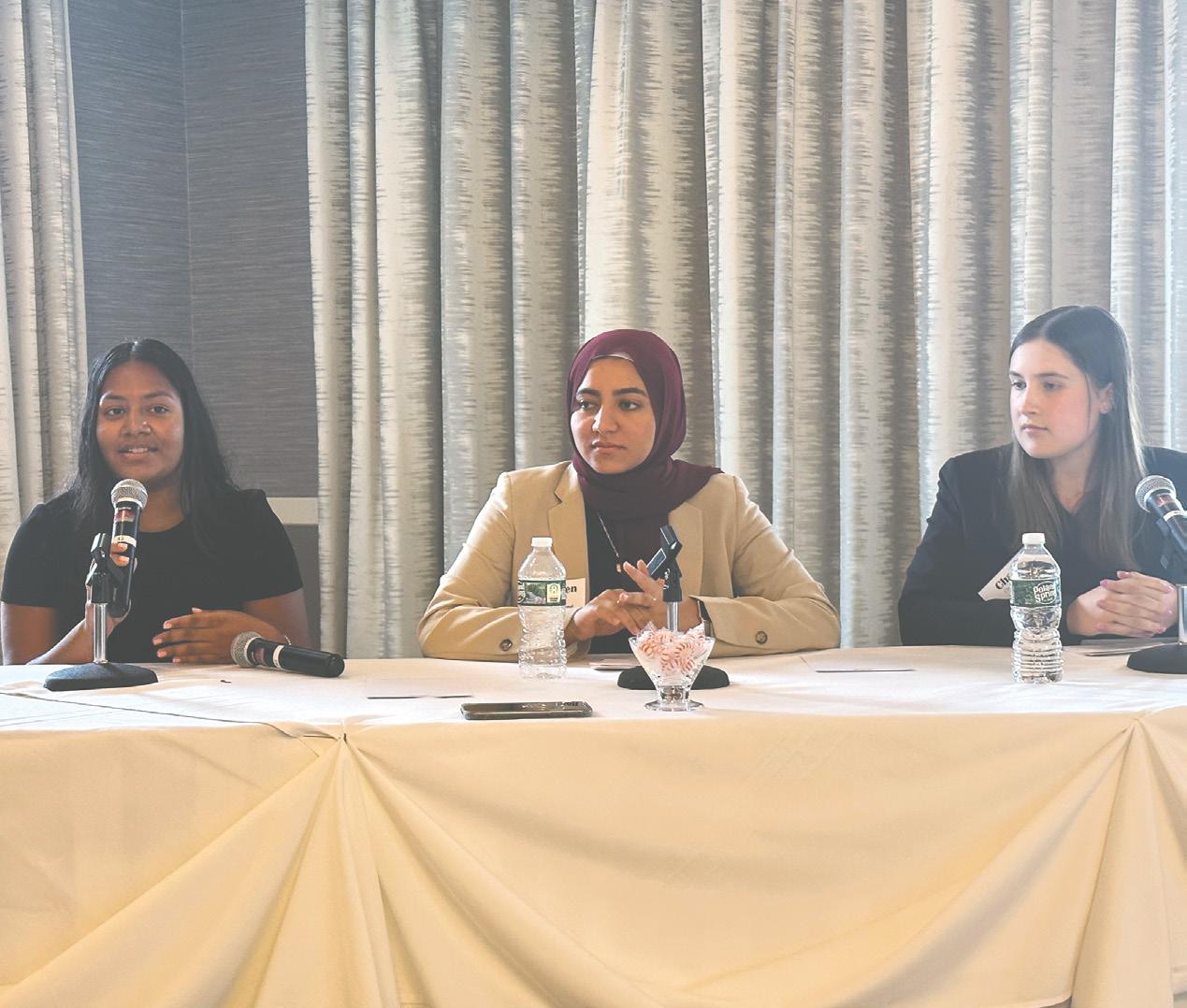
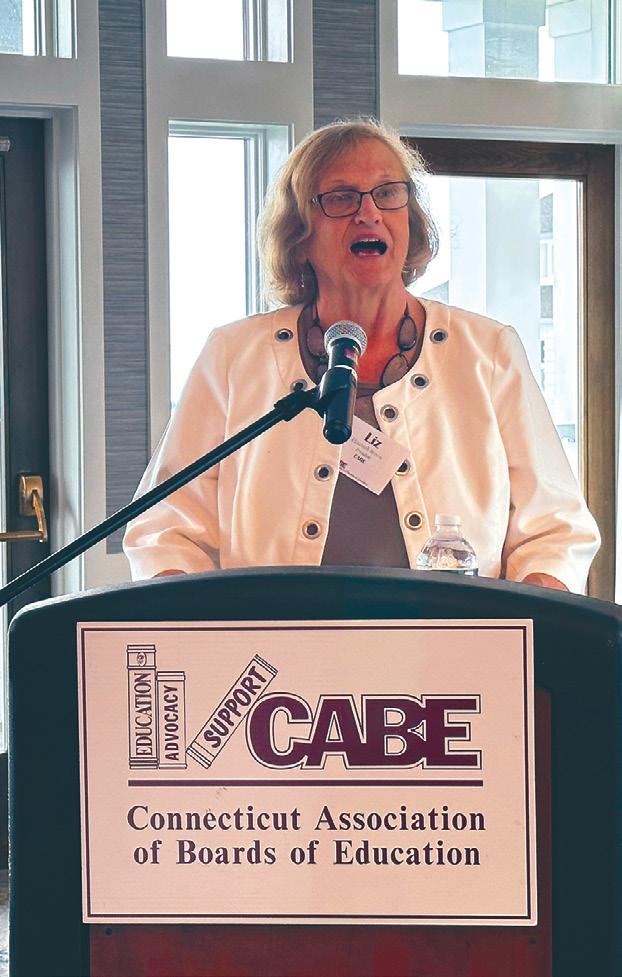
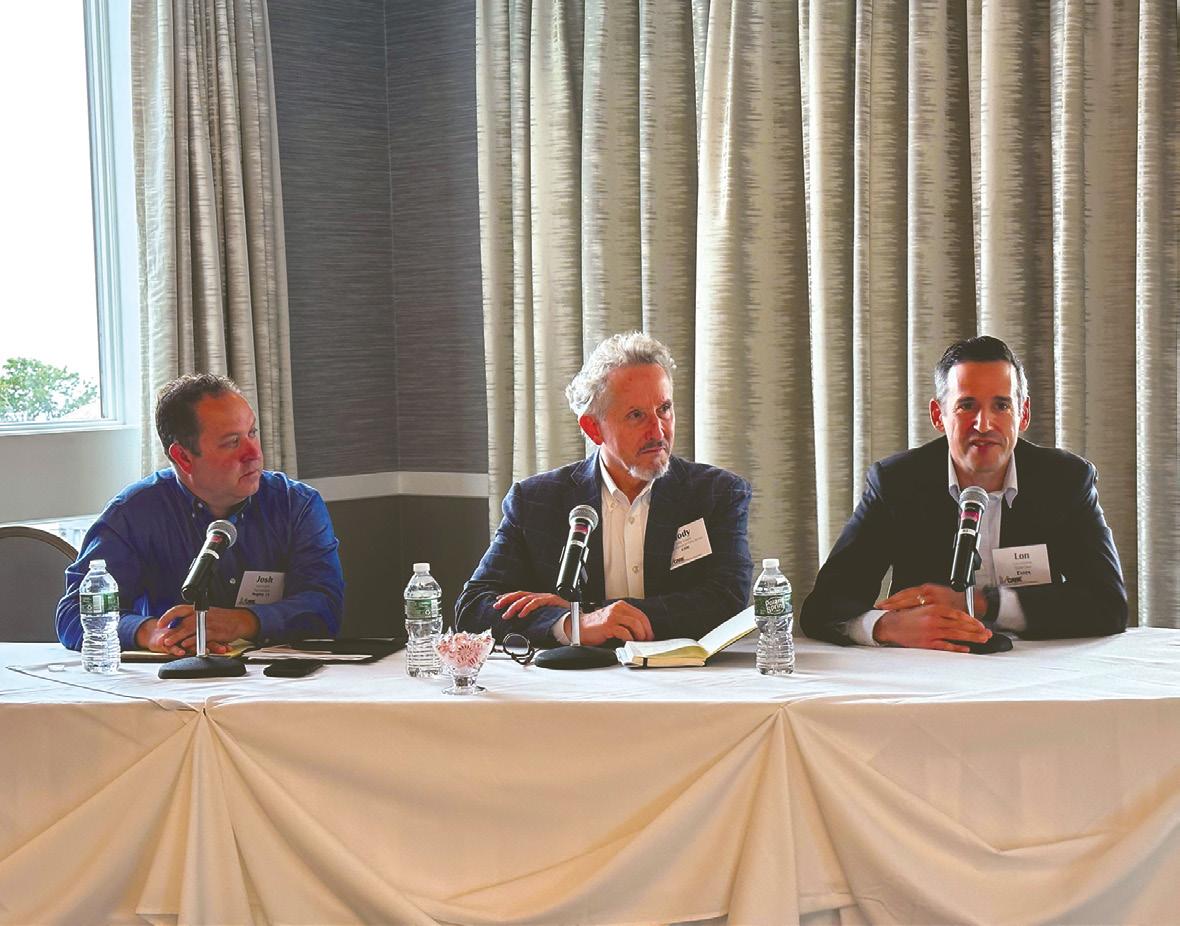
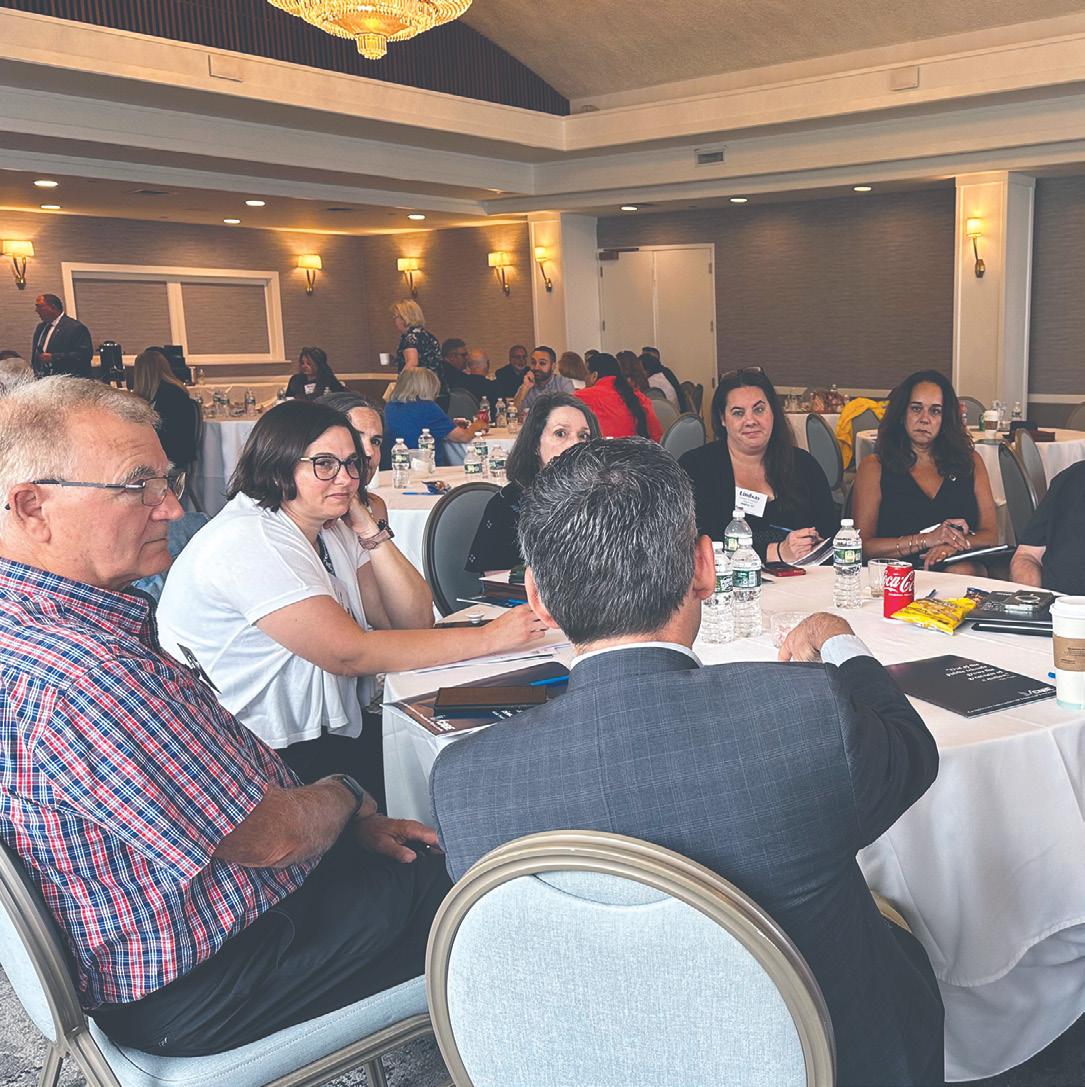
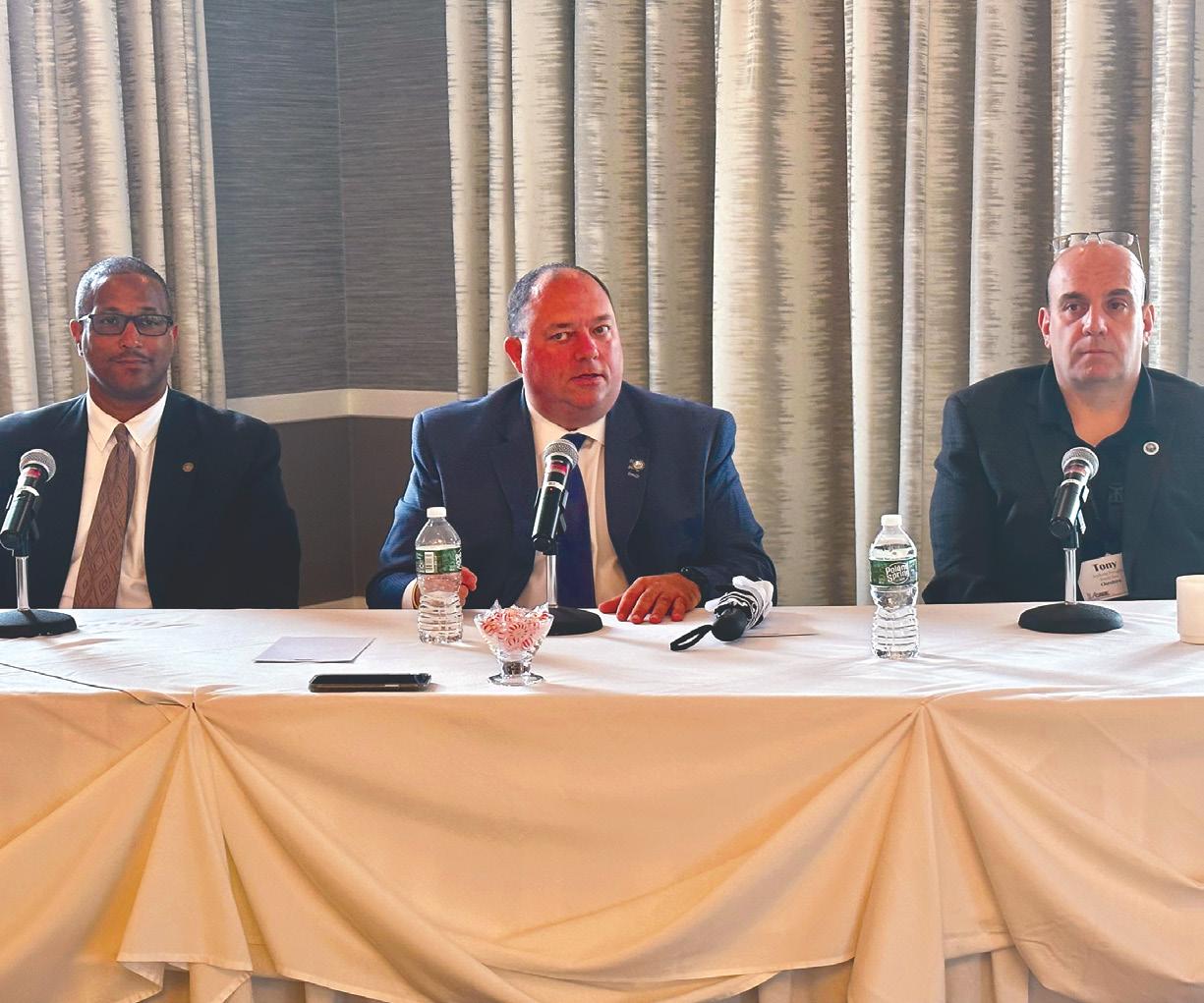
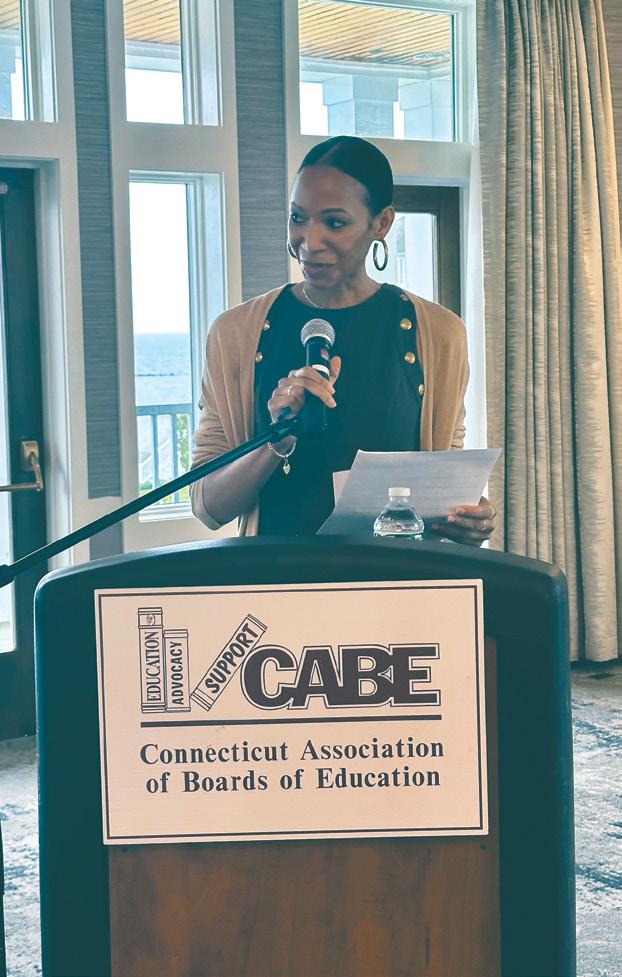
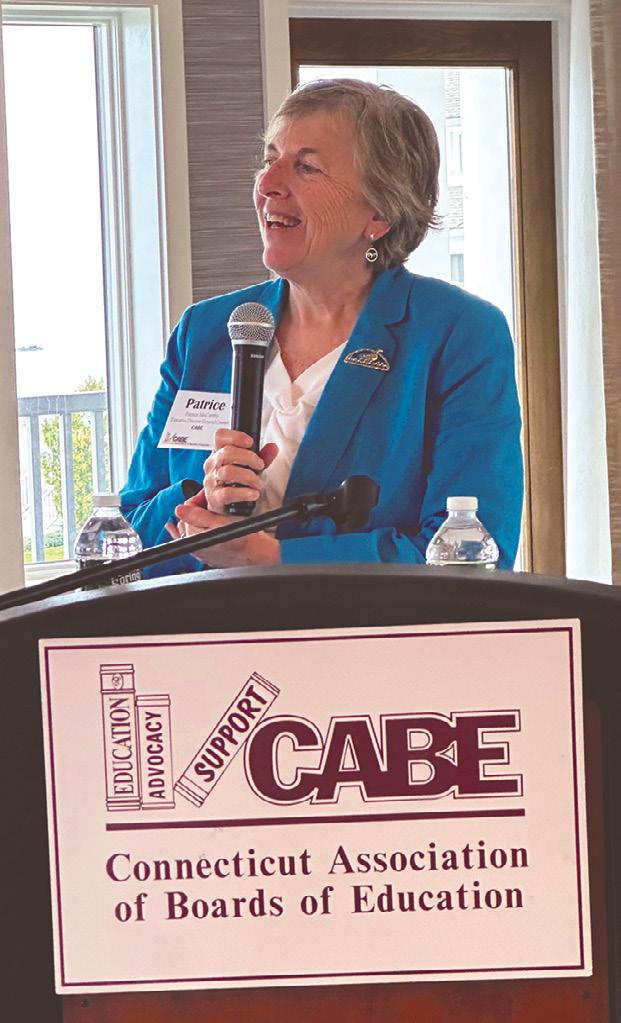
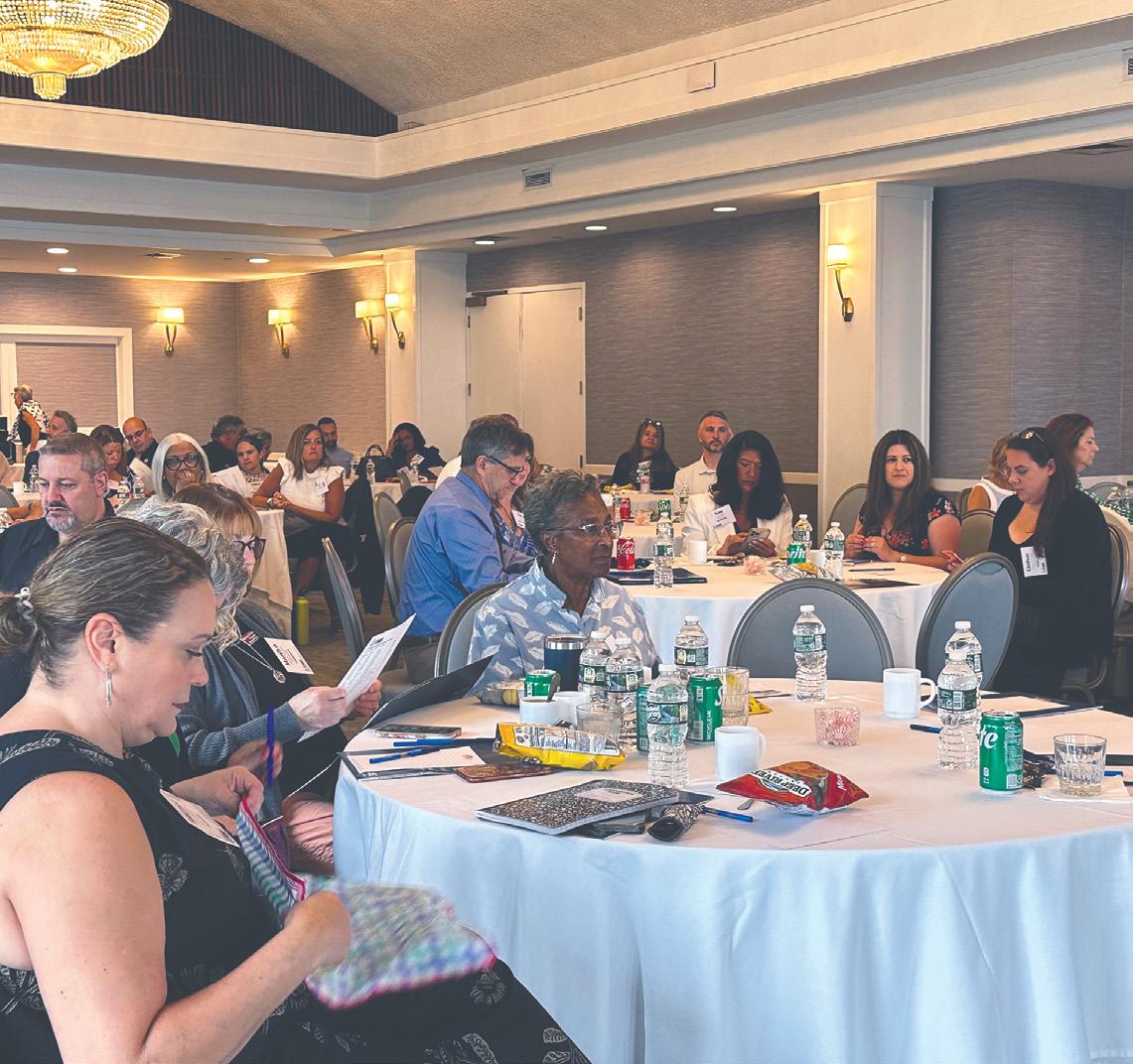
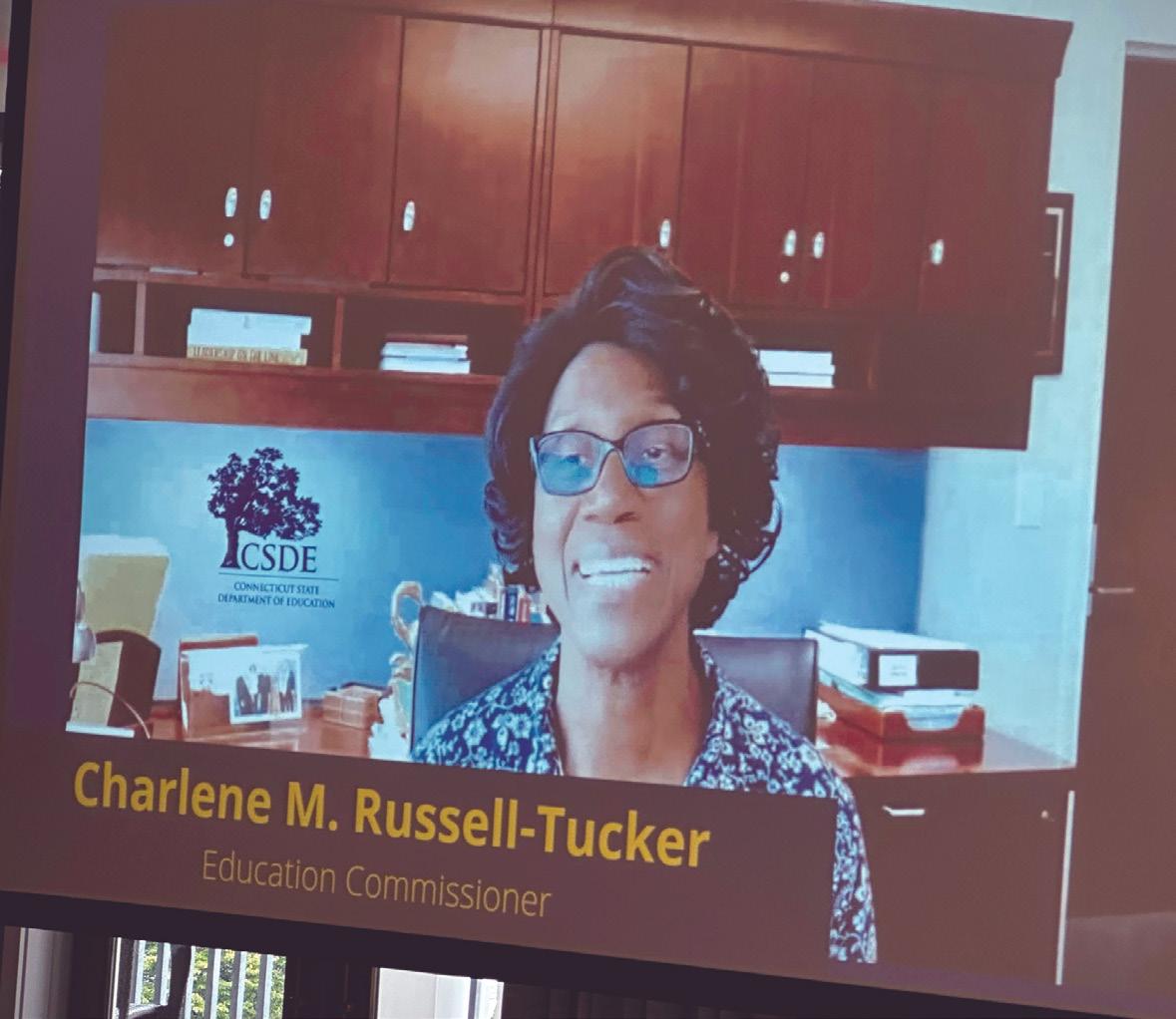
16 The Journal – Connecticut Association of Boards of Education | September, 2023
Connecticut State Commissioner of Education Charlene Russell-Tucker provided video greetings to conference participants.
Conference participants broke into areas of interest to share thoughts and concerns. Areas of interest included Board Chairs, Policy, Communications Committees, Onboarding New Board Members, and Legislative Issues.
Over 70 school board members and superintendents participated in the 13th Annual Summer Leadership Conference
(L. to R.) Ariana Mohamed (New Britain High School), Yasmeen Galal (Woodland High School, Region 16), and Charli Hughes (Woodland High School, Region 16) received a standing ovation for the Student Voice panel discussion.
(L. to R.) CABE First Vice President Leonard Lockhart (Windsor), Cheshire Superintendent Jeff Solan, and CABE Member at Large and Associate Director Tony Perugini (Cheshire) provided a panel discussion on Dealing with Controversial Issues
CABE Area 6 Co-Director Janice Cupee (Stratford) moderated the Student Voice panel.
CABE President Liz Brown (Waterbury) welcomed participants to the Conference and thanked CABE Board members for their work.
CABE Executive Director and General Counsel Patrice McCarthy moderated the Dealing with Controversial Issues discussion.
(L. to R.) Region 15 Superintendent Joshua Smith, CABE Sr. Staff Associate for Policy Services Jody Goeler, and CABE Secretary/Treasurer and Area 8 Director Lon Seidman (Essex) provided a panel discussion on Understanding AI and Its Implications for School Board Members
Developing Back-to-School Learning Opportunities for Parents
As students head back to school this fall, districts might be wise to also offer learning opportunities for parents.
Parent classes are a popular option in many districts. They help parents better understand and navigate the school system and discover tools and resources for meaningful involvement in their children’s education. Other benefits include:
• Helping parents gain a clearer understanding of education terms and jargon, so they better understand programs and policies.
• Connecting parents to a variety of resources, such as who to contact if they believe their child has a learning disability or where to go to sign up for youth sports or other activities.

• Providing parents with an opportunity to develop relationships with staff, so they can have more meaningful conversations about the needs of their child.
Some districts hold monthly parent classes in the evenings. Others sponsor a one-day parent academy on a Saturday, where parents can take a variety of classes over the course of the day.
Parents who have attended parent classes say they’ve learned valuable information, such as how to understand their child’s report card or how to help with math homework. A benefit cited by teachers and principals is that the classes have had a positive impact on parent participation and communication between parents and school.
Topics for Parent Classes
The success of parent classes depends on offering classes that interest parents. While there is usually an emphasis on academic topics, some of the most popular classes are hands-on classes on topics such as how to prepare healthy, inexpensive meals for your family. The focus is to help equip families with the tools and information they need to help
their children be ready to learn and be successful in school.
Some possible topics are:
• Tips on effective parent-school communication. Help parents understand the chain of command and how to maximize their interactions with school staff.
• How to help your English Language Learner
• What to do if your child is being bullied
• Leadership opportunities for your child
• Great tools to learn mathematics at home
• Special Ed Parent 101, to help parents understand their role in their child’s special education program
• Paying for college — learn about the cost of college and the resources available to finance it
• Love and Logic tips that can help parents neutralize their child’s arguing, set limits, prevent
power struggles, etc.
• What is STEAM (ScienceTechnology-EngineeringApplied Arts-Mathematics) education?
• How to complete the FAFSA to apply for college financial aid
• Homework survival guide for parents
• Transitioning from middle school to high school
• State tests – consider having parents take some of the assessments that students are required to take, so they can experience first-hand the level of rigor that is required.
How to get started
Funding is always a consideration when starting new programs, but it doesn’t take an oversized budget to offer parent classes. If teachers are asked to teach classes, then districts typically pay them an hourly rate to prepare for and teach the class. Some
The Journal – Connecticut Association of Boards of Education | September, 2023 17
OPPORTUNITIES page 18
See
CABE/CAPSS CONVENTION: Leading from Why!
Lisa Steimer Sr. Staff Associate for Professional Development and Communications, CABE
The CABE/CAPSS Convention, which will be held November 18-19, provides Connecticut board of education members and superintendents the opportunity to acquire knowledge through general sessions and workshops that can help them prepare students to be successful in the 21st Century.
Plan to attend the Convention and experience two days focused on student growth. Hear from top-level thought leaders on the latest educational initiatives, celebrate Connecticut’s talented students, and network with school leaders from across Connecticut.
In addition, be certain to visit the Exhibit Hall which is filled with representatives from businesses with whom
school districts do business.
Benefits of Attending
• Ensure you understand the skills that will enable students to be successful in the 21st Century by attending a variety of workshops, clinics, and general sessions delivered by local and national experts.
• Potentially save your district money and enable staff to be more efficient by speaking with vendors in the Exhibit Hall.
• Connect with other members of Connecticut’s educational leadership community to find invaluable support by sharing experiences and solutions with others.
Hotel Reservations:
Mystic Marriott Hotel 625 North Rd., Route 117 Groton, CT 06340
Those attending the CABE/CAPSS Convention have been guaranteed a room rate of $165 per night. This rate is guaranteed only until 4:00 pm on October 20, 2023. After this date, reservations for Convention participants are based on availability and are offered at the prevailing rate.
You may make reservations with the Mystic Marriott online at https:// rb.gy/iaweb. The negotiated rate code is already entered in the appropriate field, allowing you to quickly make your room reservation.
You may also call the hotel’s reservation department at 877-9016632. Note that purchase orders are not accepted; however, credit cards are accepted.
Be Inspired! Choose From Over 30 Dynamic Breakout Sessions
Some of the workshop sessions to be presented include:
• Launching and Sustaining Future-Based Schools The Pathways Experience
• Finding the Right Superintendent/Community Match to Promote Excellence and an Inspired Culture for Learning
• Understanding Artificial Intelligence and Its Implications fo School Districts Diversity, Equity and Inclusion 2023
• Tools You Can Use to Tell Your District’s Own Story
• Understanding Connecticut’s Freedom of Information Act (Including Recent Updates)
…. and so much more!
To learn more or register, please go to https://www.cabe.org/professional-development/convention
We hope to see you at the Convention in November!
Why Public Relations for Your District is a Must
Ann Baldwin President and CEo, Baldwin Media
Many people don’t really understand the true meaning or the benefits of public relations. In fact, a lot of people don’t even know what it is. I explain public relations as intentional, consistent communication and active listening to your audiences that establishes and nurtures positive, mutually beneficial relationships. Now ask yourself, “Is that something my school can afford to do without?”
People in the News
Robert Guthrie, a member of the West Haven Board of Education and CABE Area 7 Co-Director, was recently elected Secretary/Treasurer of the National Volunteer Fire Council. Bob had previously served on the Council legislative committee and Executive Board. Congratulations, Bob, on your election and thank you for the many facets of your volunteer service.
It seems that, especially today, everyone is looking for “transparency” in communication, as they should. Meanwhile, what they don’t realize is that communicating transparently is a full-time job. Boards of Education and schools are doing a great job educating, but the problem is that in many cases, no one really knows about the details of it. With the distractions that sometimes occur in our schools and the reality that public education is a media target, it is becoming more difficult to communicate the good things that are being done in districts on a
OPPORTUNITIES
(continued from page 17)
community presenters are happy to donate their time to teach classes that they feel are important. It’s important to provide child care. Usually the only other expense is refreshments.
Districts that have successfully offered parent classes say the rewards –better informed and better-connected parents – far outweigh the expense.
Here are steps to begin organizing a series of parent classes:
• Form a planning committee
daily basis.
Many educators and school officials are of the mindset that their district only needs public relations if there is a crisis. Think again. If you have taken the time, energy and effort to build support for your schools throughout the school year, then the better the chances that you have also built respect and credibility with your school community and other stakeholders. Trust and respect are the one foundation that you want when it comes to communicating, so that people are more likely to give you the
that includes parents and staff. Parents are your best source for knowing the kinds of questions and topics that other parents would find most helpful.
• Make it easy for parents to attend by offering free child care.
• Feed them! Provide coffee and cookies or other small snacks.
• Recruit some of your staff “stars” to teach classes and showcase some of the new ways teachers are teaching and students are learning.
benefit of the doubt when a crisis hits. Utilizing best practices of transparency and consistency can be your best advantage in a number of situations, but the key is that it has to be a priority. Taking the time to share with your community all of the good that is going on in our schools is well worth the time and the effort. Trust me, even when you think no one is paying attention, or that they even care, there are still those who do. Public relations for schools is just as important, if not more important, when there is good news to share.
• Invite the media and local civic leaders to attend, so they can learn more about the higher expectations for students and staff.
• If your district has a large population of English learners, consider conducting some of the classes in another language.
• Hand out evaluation forms and not only ask for feedback on the sessions but also suggestions for future topics.
Contributed by Connie Potter, communications consultant.
18 The Journal – Connecticut Association of Boards of Education | September, 2023
2023
Understanding Connecticut’s FOIA WHILE WE ENJOYED OUR SUMMER: What Has (and Has Not) Changed With the FOIA
Mark J. Sommaruga, Esq. Pullman & Comley, LLC
Now that we all (hopefully) had some relaxing and rejuvenating moments this summer, it is time to get back to work and school. While enjoying the sun, some of you may have had passing thoughts about changes in Connecticut’s Freedom of Information Act’s (“FOIA”), especially in light of rumors of possible significant revisions during last spring’s legislative session. Here is a listing of what is new and what (mercifully) was not enacted by our legislature.
What Is New With The FOIA?
Increased Penalties When One “Mess Up.” For years, the Freedom of Information Commission (“FOIC”) was empowered to impose a maximum fine to public officials of $1,000 in situations where the FOIC found that the denial of FOIA rights was “without reasonable grounds.” Public Act 23-200, which takes effect on October 1, 2023, increases the maximum fine from $1,000 to $5,000. Public Act 23-200 further authorizes the FOIC to issue fines against public officials where the FOIC finds that a public agency is engaging in 1) “a practice or pattern of conduct that constitutes an obstruction of any right” conferred by the FOIA, or 2) “reckless, willful, or wanton misconduct” in delaying or denying responses to public records requests. In addition, the FOIC is now broadly empowered to order such relief that it determines is appropriate to rectify any such obstruction or misconduct and deter a public agency from violating the FOIA; the FOIC may also seek an order from the courts requiring the public agency to comply with FOIC orders.
So, Why Is This Important? Unlike most situations, where public officials (whether school district employees or board members) are indemnified from personal liability, fines may have to be paid by officials responsible for FOIA violation out of their own pockets; indeed, indemnification by a public agency of an offending agency members’/employees’ FOIA fines may be prohibited by law. As such, it is incumbent upon public officials to act in good faith, and also to learn from (and not repeat) any mistakes that they
make, to avoid incurring the increased wrath of the FOIC.
Website Posting of Board of Education Agendas and Meeting
Documents One of the new legal requirements imposes a burden specifically on school boards. Effective July 1, 2023, Public Act 23-160 expressly requires boards of education conducting a regular or special meeting to 1) make available for public inspection the agenda for the meeting, along with “any associated documents that may be reviewed by members of the board at the meeting” and 2) post such agenda and documents on the district’s website Previously, agendas only had to posted online for either special or remote/ hybrid meetings, but it is now required for ALL school board agendas. The requirement of having such “associated materials” be available to the public prior to the meeting (and be posted online) would clearly not apply to records that are exempt from public disclosure, but it basically requires that traditional “board members packets” be produced/be available in advance to the public at large.
So, When Must the School District Post These Materials Online? Good question. This new law does not specify when (and how much in advance of the meeting) “board member packet” documents must be posted. In addition, the law also does not address unique circumstances where the materials may not have been available or even existed prior to the meeting. Simply put, you should post these materials as soon as reasonably possible.
It Could Have Been (Arguably)
Worse: What Did Not Pass Remote Meetings and Board
Member Participation: House Bill 6906 would have required any board member participating remotely in a meeting to participate only “by means of electronic equipment that is capable of transmitting video of such member.” As this bill did not pass, board members may still be able to participate in a remote meeting even if they do not have (or do not choose to utilize) video technology, provided that their telephonic/audio technology provides “real-time public access”
and permits the public to monitor the member’s participation, subject to any board bylaws.
Employee Addresses (and Notice to Public Employees of
Public
FOIA Requests): Most residential addresses of public agency employees are NOT exempt from disclosure, and must be provided to members of the public. Senate Bill 1157 would have expanded the limited exemptions so as to make ALL public employee addresses exempt from disclosure. In addition, this bill would have required public agencies to provide advance notice to any employee whenever there is a “mass request” (i.e., a request concerning 50 or more employees) before an agency complies with a FOIA request. However, Senate Bill 1157 died in the closing days of the legislative session.
Public Comments. House Bill 5796 would have amended the FOIA so as to require public agencies to have public comment periods at all of
their regular and special meetings. As this bill did not pass, the decision as to whether to have public comments at board meetings remains a local decision.
Attorney Sommaruga is the author of “Understanding Connecticut’s Freedom of Information Act” (5th Edition 2018). Pullman & Comley is a CABE Business Affiliate.

ROUNDTABLE
(continued from page 1)
taking these issues into consideration when issuing guidance to families and school districts.
There was also a presentation on the Pledge to Advance CT (PACT) which enables high school graduates to attend community college tuition free. The program applies to students who enroll either full-time or parttime, and beginning July 1, 2024 students can re-enter the program.
The Journal – Connecticut Association of Boards of Education | September, 2023 19
Trusted Legal Counsel to Connecticut School Districts

Experience matters. For decades, our attorneys have been consistent leaders in representing local and regional boards in labor and employment law, school law, board governance, special education, vendor relations and student issues. We value the personal connections we make with clients and take pride in our responsiveness to their needs. And, as a full-service law firm, we have the capacity to represent clients on a litany of issues ranging from technology and intellectual property to construction and land use matters.
Need additional training for your staff? Our School Law seminars and training programs can be customized to address your district’s needs on topics including Diversity and Inclusion in Employment, Sexual Harassment Prevention, DCF Mandated Reporter Training and Freedom of Information Act. For seminar & training programs contact Melinda Kaufmann, 860.424.4390 or mkaufmann@pullcom.com
Stephen M. Sedor, Chair, 203.330.2137 or ssedor@pullcom.com
20 The Journal – Connecticut Association of Boards of Education | September, 2023 pullcom.com BRIDGEPORT HARTFORD SPRINGFIELD WAKEFIELD WATERBURY WESTPORT WHITE PLAINS 203.330.2000 860.424.4300 413.314.6160 401.360.1533 203.573.9700 203.254.5000 914.705.5355
Subscribe to our Education Law Notes blog for up-to-the-minute alerts,
and
PULLMAN & COMLEY SCHOOL LAW PRACTICE
commentary
insights on critical legal issues affecting educational institutions. pullcom.com/education-law-notes




































